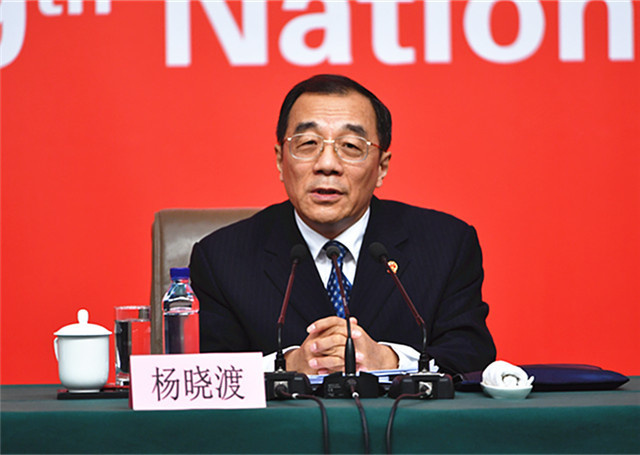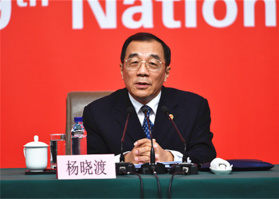By Jiang Jie, Huang Fahong from People’s Daily
China’s latest reforms in its national supervisory effort are expected to provide a better guarantee in the crackdown on corruption and help create a better system with Chinese characteristics, experts said on Thursday, on the sidelines of the 19th National Congress of the Communist Party of China (CPC).
China’s decision to set up a national supervisory commission next year, as part of the state supervisory reforms, is meant to centralize and unify the system and make it more authoritative and efficient, official from China’s discipline watchdog told a press conference on Thursday.
Having a commission will allow the Party to centralize its guidance in the nationwide anti-graft drive, explained Yang Xiaodu, vice-secretary of the CPC Central Commission for Discipline Inspection (CCDI).
The reforms can ensure that the supervision reaches everyone exercising power in the public sector and help modernize China’s governance and governing ability, added Yang, who is also Minister of Supervision, and head of the National Bureau of Corruption Prevention.
Pilot reforms have finished in the Beijing Municipality and Shanxi and Zhejiang provinces, so the national commission can extend the reforms to the rest of the country , Yang said.
President Xi Jinping said that China will have these supervisory commissions at the national, provincial, city, and county level, in his speech at the opening of the 19th CPC National Congress, on Wednesday, explaining that they will share offices and work with the Party's disciplinary inspection commissions.
The supervisory commissions will have the responsibility and investigative power and means under the law, Xi said, adding that there will also be a national supervision law to back this.
The statement that China will replace the old "lianggui" practice with detention really caught people’s attention. , "Lianggui"refers to the former intra-party disciplinary practice that requires a CPC member under investigation to cooperate with questioning at a designated place and a designated time.
This practice was introduced into Party regulations in 1994 and was handled by Party disciplinary officials. But the description, which is not a legal term, can be easily misunderstood in relation to the law. The new changes will provide more legal guarantees for China’s crackdown on corruption, analysts said.
Over the past few years, General Secretary Xi has presided over many meetings on system reforms and supervisory laws and his work has been seen as a demonstration of China’s true sense of mission and the courage to improve itself.
Experts have said that the reforms are a creative attempt to ease China into a supervisory system with Chinese characteristics, but one that differs from the Western style of "separation of powers".
In commending China on its decision to change the Administrative Supervisory Law to a national supervisory law and to give supervisory commissions the necessary powers and means to investigate cases, the scholars said that a crackdown on corruption with a legal backing and ways and means will help the country modernize its governance system more.
The supervisory commissions are neither administrative nor judicial institutions, but are watchdogs that exercise supervisory powers on behalf of the Party and government. So far, there are 47 work groups that the CCDI has set up to monitor 139 central agencies.
Pic:
Yang Xiaodu, vice-secretary of the CPC Central Commission for Discipline Inspection (CCDI) Photo by People’s Daily Online
China’s decision to set up a national supervisory commission next year, as part of the state supervisory reforms, is meant to centralize and unify the system and make it more authoritative and efficient, official from China’s discipline watchdog told a press conference on Thursday.
Having a commission will allow the Party to centralize its guidance in the nationwide anti-graft drive, explained Yang Xiaodu, vice-secretary of the CPC Central Commission for Discipline Inspection (CCDI).
The reforms can ensure that the supervision reaches everyone exercising power in the public sector and help modernize China’s governance and governing ability, added Yang, who is also Minister of Supervision, and head of the National Bureau of Corruption Prevention.
Pilot reforms have finished in the Beijing Municipality and Shanxi and Zhejiang provinces, so the national commission can extend the reforms to the rest of the country , Yang said.
President Xi Jinping said that China will have these supervisory commissions at the national, provincial, city, and county level, in his speech at the opening of the 19th CPC National Congress, on Wednesday, explaining that they will share offices and work with the Party's disciplinary inspection commissions.
The supervisory commissions will have the responsibility and investigative power and means under the law, Xi said, adding that there will also be a national supervision law to back this.
The statement that China will replace the old "lianggui" practice with detention really caught people’s attention. , "Lianggui"refers to the former intra-party disciplinary practice that requires a CPC member under investigation to cooperate with questioning at a designated place and a designated time.
This practice was introduced into Party regulations in 1994 and was handled by Party disciplinary officials. But the description, which is not a legal term, can be easily misunderstood in relation to the law. The new changes will provide more legal guarantees for China’s crackdown on corruption, analysts said.
Over the past few years, General Secretary Xi has presided over many meetings on system reforms and supervisory laws and his work has been seen as a demonstration of China’s true sense of mission and the courage to improve itself.
Experts have said that the reforms are a creative attempt to ease China into a supervisory system with Chinese characteristics, but one that differs from the Western style of "separation of powers".
In commending China on its decision to change the Administrative Supervisory Law to a national supervisory law and to give supervisory commissions the necessary powers and means to investigate cases, the scholars said that a crackdown on corruption with a legal backing and ways and means will help the country modernize its governance system more.
The supervisory commissions are neither administrative nor judicial institutions, but are watchdogs that exercise supervisory powers on behalf of the Party and government. So far, there are 47 work groups that the CCDI has set up to monitor 139 central agencies.
Pic:
Yang Xiaodu, vice-secretary of the CPC Central Commission for Discipline Inspection (CCDI) Photo by People’s Daily Online
 Menu
Menu
 Latest reform leading China to a supervision system with Chinese characteristics: experts
Latest reform leading China to a supervision system with Chinese characteristics: experts

















